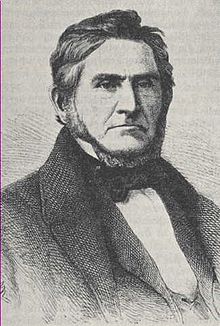Christian Hermann Weisse
Christian Hermann Weisse (also: White * 10. August 1801 in Leipzig , † 19th September 1866 ) was a Protestant theologian and philosopher spätidealistischer.
White was a son of the historian Christian Ernst Weisse (1766-1832) and his wife Christiana Elisabeth Weiß (1778-1826), a daughter of the Leipzig theologian Christian Samuel Weiß (1738-1805) and sister of the mineralogist Christian Samuel Weiss (1780-1856) ).
He taught philosophy from 1828 to 1837 and from 1841 to 1866 at the University of Leipzig , since 1845 as a full professor. Against David Friedrich Strauss , Weisse tried to reconstruct the historical Jesus . In his Evangelical History (1838) he presents a two-source theory ( synoptic problem ) that has been modified from Schleiermacher . Schleiermacher's collection of Hebrew speeches became the source of the gospel of Matthew for him ; He replaced Schleiermacher's original Mark with the Gospel of Mark , which he understood as the first representation of the life of Jesus based on authentic memories and which he ascribed to the companion of Peter, Johannes Mark . Weisse is one of the founders of the Markus priority alongside Karl Lachmann , Gottlob Christian Storr and Christian Gottlob Wilke . However, in a dispute with Heinrich Ewald in 1856, he changed his theory and assumed that before the canonical St. Mark there was still an original St. Mark's Gospel, which had special property from Matthew and Lucan .
Works
- System of Aesthetics (2 vols., 1830);
- The Protestant history critically and philosophically edited , (2 vols.), Leipzig 1838
- The Gospel Question in its Present Stage , Breitkopf and Härtel: Leipzig 1856
- Philosophical dogmatics or philosophy of Christianity (3 vols., 1855–1862)
literature
- Max Heinze : Weisse, Christian Hermann . In: Allgemeine Deutsche Biographie (ADB). Volume 41, Duncker & Humblot, Leipzig 1896, pp. 590-594.
- Gero von Wilcke: A Leipzig pedigree. On the 100th anniversary of the death of the philosopher CH Weisse . In: Archive for Family Research , Volume 1967/68, pp. 13–28.
- Klaus-Gunther Wesseling: Weisse, Christian Hermann. In: Biographisch-Bibliographisches Kirchenlexikon (BBKL). Volume 13, Bautz, Herzberg 1998, ISBN 3-88309-072-7 , Sp. 684-690.
Web links
- Literature by and about Christian Hermann Weisse in the catalog of the German National Library
- Overview of Christian Hermann Weisse's courses at the University of Leipzig (winter semester 1823 to winter semester 1866)
- Christian Hermann Weisse in the professorial catalog of the University of Leipzig
| personal data | |
|---|---|
| SURNAME | Weisse, Christian Hermann |
| ALTERNATIVE NAMES | Christian Hermann Weisse |
| BRIEF DESCRIPTION | Protestant theologian and late idealist philosopher |
| DATE OF BIRTH | August 10, 1801 |
| PLACE OF BIRTH | Leipzig |
| DATE OF DEATH | September 19, 1866 |
| Place of death | Leipzig |
